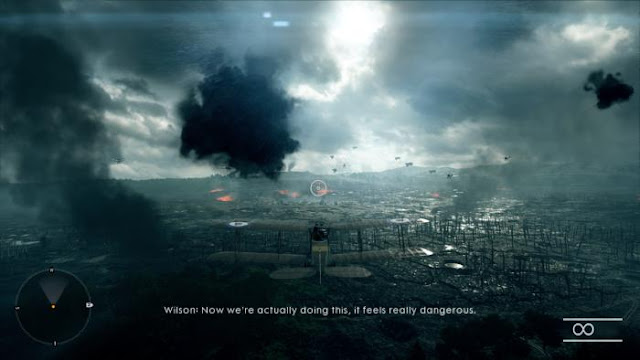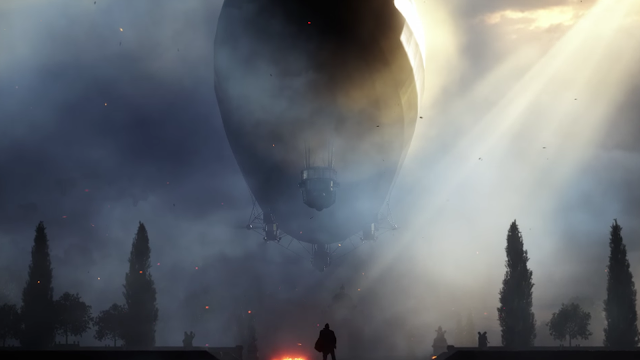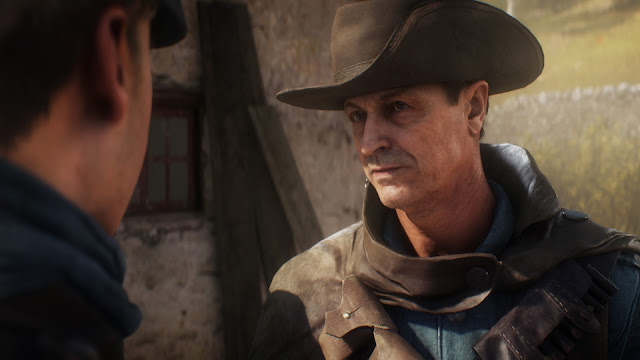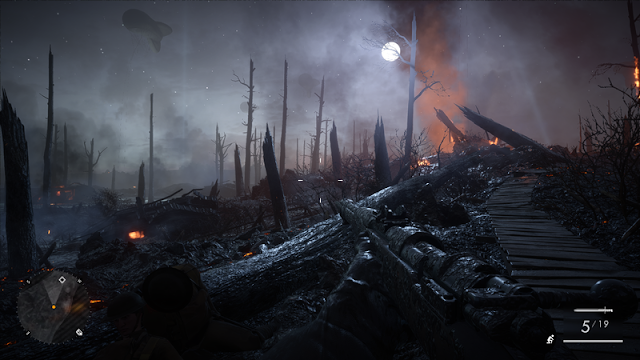Game Theory by Matt S.
Battlefield 1 represents everything wrong with blockbuster storytelling. What has been billed as an attempt to represent the stories and the reality of one of the most horrific wars in human history instead comes across as dangerously revisionist and imperialist. The military hero worship is so overdone that it’s simultaneously a piece of propaganda and a complete insult to the people who actually fought in that war.
There’s just so much wrong with this game’s narrative that I’m struggling to find a meaningful starting point. Instead, I’ll break it down into various components and discuss each individually. The game’s real problem is that it manages to bring all these separate issues together to create one giant mess of a narrative, but in breaking things down I hope I’m highlighting the extent of Battlefield 1’s problems with the way we (in the West) generally approach military history and storytelling. Films and literature are every bit as guilty of doing what I detail below, but in this game it’s handled in an even more infantile manner, as most games struggle to work nuance into their storytelling.
Revisionism and Battlefield 1: leading people dangerously astray
The biggest issue that I have with Battlefield is its revisionist approach to history through its storytelling. This is a game that has no interest in providing a balanced look at the circumstances around the war. Instead, it subjects us to a reductive “goodies vs. baddies” narrative that, in the process, teaches a dangerously limited understanding of the war, and one that verges on being outright propaganda.
In Battlefield 1, you play through a half dozen or so ‘stories.’ Each time, you’re fighting on the side of allies, and each time the reason why you’re fighting isn’t really relevant; all that matters is that you’ve got orders to follow, and you’re barrelling through them while shooting down hordes of enemies.
The problem is that each and every one of these stories features characters from one side of the conflict: that of the Allies. The Central Powers barely have any voiced characters, and when they do (such as one of the Ottoman officers who briefly makes an appearance in the Lawrence of Arabia story), they are little more than villainous caricatures. This, of course, means that only one side of the conflict is humanised, and we’re led to sympathise directly with that side while glossing over its own grievous flaws throughout the war.
So herewith a brief (actual) history of World War 1, because it reveals that neither side was “right” in the conflict and there was every reason to sympathise equally with both sides. For the circumstances that led to the war were a bunch of nonsense; it should simply never have happened.
An Austrian royal was assassinated, and fearing that this was a precursor to the breakup of the Austro-Hungarian Empire, Austria-Hungary planned to invade Serbia, which they perceived to be the agitators in the conflict. The Russians were concerned by this development and mobilised their military. This caused Germany to mobilise its military and demand Russia step down. When Russia didn’t, Germany felt compelled to declare war on its now highly militarised neighbour. This caused France to mobilise for war. Which caused Germany to declare war on it too, now feeling like it was crushed between two powers. Germany decided the only strategic option it had was to invade France through Belgium, however Belgium was neutral, so when Germany’s forces rolled through, a treaty between Belgium and the United Kingdom kicked in, forcing the UK to declare war on Germany. Then Germany used the Ottoman Empire’s trade dependency on it to force the Ottomans to declare war on Russia. And then England, Germany, The Ottomans, France and so on decided to force all their subjugated peoples in Africa and Asia to fight for them too. World War 1. America joined the war later, in 1917, because it was keen on proving itself to be a military power, and America likes getting itself involved in military conflict.
The reality of World War 1 is that it was a arbitrary war that didn’t actually need to be fought. There was no right or wrong – with the possible exception of Austria-Hungary’s aggression towards Serbia. Unlike World War 2, there wasn’t a man at the head of one of the sides who posed a genuine existential threat to an entire people. World War 1 was a series of treaties blowing up in the faces of a bunch of nations that weren’t that interested in fighting in wars.
This is why it’s a problem that Battlefield 1 doesn’t present any stories from “the other side.” For a game that obstinately claims to offer a story highlighting the horrors and impact of war to be so unsympathetic to one side as to characterise them as nothing more than cannon fodder to blow through is to fail to represent the nuances of the conflict in any way. And yet, by latching on to history so intensely, and including just enough historical truths to place the game within that unique conflict (an emphasis on trench warfare, the use of Zeppelin blimps in combat), Battlefield 1 is claiming the authority of authenticity. No one who plays this game is going to come away with anything but a dangerously skewed understanding of the motivations and context behind the war. This is a problem in itself because already the understanding that people in the West have of the war is limited and badly tainted by the propaganda that comes from being on the winning side.
Imperialism and Battlefield 1: The silence is deafening
World War 1 was also one of the most extreme examples of empires exploiting their colonies (or recently liberated colonies that still relied heavily on their former empire, such as Australia and India) to do the really dirty work we’ve seen to date. Faced with the difficult task of establishing a beachhead on the coast of Gallipoli, the British forces sent in the Australians and New Zealanders. The Germans and French drained their own African colonies for their respective fronts.
And, most significantly of all, after World War 1 the Arabs – who were pulled into the war by the British and were instrumental in causing the downfall of the Ottoman Empire – were knifed in the back when a secret deal allowed the French to re-colonise Syria, which the British had also publicly promised to the Arabs. It’s no exaggeration at all to say the current problems in the Middle East towards the West started at that precise moment.
Indeed, a lot of what has happened in Africa as nations fought for independence was a consequence of World War 1 and the subsequent heightened tensions as the people felt absolutely used and betrayed by the colonists. It’s impossible to have a fruitful discussion about WW1 without considering the impact that imperialism had on it; but the closest Battlefield 1 ever gets is when, during the Gallipoli story, the Australian protagonist mutters “bloody English” as they (the British) withdraw forces and start shelling the position without telling a unit of ANZ soldiers what they were about to do.
Needless to say, that’s not adequate, and Battlefield 1 feels especially complicit in the imperialist viewpoint when you get to another campaign, the Lawrence of Arabia one. To EA’s credit, you don’t play as Lawrence, but rather an Arabian woman. And equally to EA’s credit, Lawrence’s role isn’t to order your character around; she does seem to have her own agency and is an empowered warrior woman. But where the film, Lawrence of Arabia, was so effective in showing how the Arabs were ultimately betrayed by the imperialist English, this game sidesteps all that entirely.
Imperialism and nationalism go hand-in-hand, and in failing to be adequately critical of the conduct of the Allied Powers, EA has inadvertently condoned imperialism and encouraged nationalism. While Battlefield 1 does focus on individual stories of characters rather than the broader political environment, in hero-ising the individuals and failing to be critical enough of that political environment, the game is directly supporting the actions of those nations; made all the worse because, again, the enemies are nameless faces with no value beyond their capacity to be killed.
Military hero worship really needs to stop
Note: Spoilers for the next couple of paragraphs below
In one scene in Battlefield 1 my character, a fighter pilot, was single-handedly mowing down giant Zeppelin airships with an anti-aircraft gun that he had appropriated from an airship he’d crashed his plane into (don’t ask me how the airship was still aloft – it shouldn’t have been). Then one of the destroyed Zeppelins crashed into the one my character was using, and he leaped off it – in full flight. In the very next scene he’s emerging from a river, not even slightly injured from a massive drop from an airship high in the clouds. And yeah, he’s an unreliable narrator sort (revealed in a horribly contrived way, mind), and we can’t be sure of just how valid his heroism is, but there are plenty of other examples through the campaigns that are almost as ridiculous, and those are told straight-faced.
It was utterly ridiculous. It was something that you’d expect to see in The Avengers. For all Battlefield 1’s promises that it was taking the death count of World War 1 seriously, as soon as the action starts up, the ludonarrative dissonance kicks in and you’re playing a series of heroes who, as far as the narrative is concerned, are infallible.
“Superheroing” the characters elevates them, and beyond their superhuman physical abilities, in each story the hero quickly becomes positioned as a moral point of light in a dark situation. Whether they’re rescuing fellow soldiers from the no man’s zone or offering to take on dangerous missions so that young kids don’t need to, this game of stories about soldiers decides to elevate each character’s heroic qualities. They’re strong, noble, self-sacrificing individuals to a fault, and they’re willing to take extreme risks for the benefits of those around them, to either go out in a blaze of glory, or emerge the other end alive and decorated.
Military worship is a substantial problem in western culture, because it leads directly to a militarised culture. Respect is one thing (and of course there needs to be respect for military sacrifice), but what games like Battlefield 1 do is far greater than respect. Games like Battlefield 1 exaggerate the qualities of soldiers to the extreme, on a par with superheroes, and, just as with superheroes, thus justify the violence and destruction they cause. Because they’re infallible.
Indeed, what I saw throughout my time in Battlefield 1 was a spitting image of the heroic propaganda paintings I saw in a Japanese gallery exhibition that I went to last year. Japanese artists would paint the most spectacularly inspiring paintings of their soldiers struggling against the might of the enemy – throwing their lives at the cause and for one another. As with Battlefield 1 the artists aimed for a “noble realism,” where the full horrors of war were on full display, but the heroes were defying the very horror of what was around them through their struggling, suffering, and heroic deeds. The fine line between what we determine to be propaganda and what is not would seem to be simply what side we’re viewing, but realistically all forms of military hero worship are propaganda, and the difference between this game, and the Japanese World War 2 paintings, is not that great at all.
Now, comic books and superhero films are starting to overtly question the hero worship of the ‘superheroes,’ but games aren’t quite there yet. The number of military games with the audacity to actually question what the “heroes” are doing can be counted on one hand. Either their actions are completely justified and noble or, in order to be slightly more ‘edgy’, a game might give players an “anti-hero” who still ends up justified in what he/she is doing by the fact the other side is worse. Battlefield 1, in its focus on promotion of “mateship” and the heroism of soldiers looking out for one another, ends up as a mouthpiece for military worship propaganda. You can almost see the military recruiters rubbing their hands over this game.
Battlefield 1: A game of thematic inconsistencies
Finally, a note on a more mechanical flaw within Battlefield 1. This is a game that makes a big deal out of the ‘futility of war.’ An admittedly impressive opening sequence puts you in control of half a dozen or so soldiers who are doomed. It’s impossible to avoid their eventual deaths. This is the game’s version of a tutorial. Unfortunately, from that point on, the game completely forgets about the key theme it set out to develop.
Battlefield 1 gamifies war, as every FPS does. There’s a focus on the multiplayer experience, in which you’re earning points for killing other players over, and over, and over again. There’s no consequence to dying, or even dying a lot and eventually losing the match. You just play another one. And, of course, if you’re good at killing, you earn trophies.
Weapons in the game, meanwhile, are unrealistic to World War 1 because there’s a far more visceral thrill to shooting an automatic than an unreliable rifle that takes an age to reload. Weapons in World War 1 are not the visceral war machines that dominate modern battlefields. Battlefield 1 gets the aesthetics right, but modifies the gun’s behaviour so that it works basically as well as any modern gun does.
Earning a trophy for slaughtering a bunch of people with melee attacks hardly sits well with the game’s purported musings on the ‘futility of war.’ There’s never the sense that you’re meant to reflect on the actual bloodletting in war. It’s presented as quite harmless and routine. If Battlefield 1 was taking itself – and the war – seriously, the one thing we should certainly not be towards a war like World War 1 is desensitised.
None of this is meant to suggest that you can’t enjoy Battlefield 1 – that should go without saying. Sadly, the games industry has a legion of people who get offended at the slightest hint of criticism of their favourite games, so there’s the disclaimer; yes, you’re allowed to like this game. However, it’s important that we recognise just how poor and downright misleading this game is in representing firstly the horrors of war in general, but secondly World War 1 itself. This is a war that needs to be remembered with horror. “Lest we forget” is a phrase used with reference to World War 1 precisely because, if we ever were to rewrite history, romanticising or glorifying the war just as Battlefield 1 has done, then there’s every chance that it might happen again.
Frankly, I think the developers have a lot to answer for with this game.
– Matt S.
Editor-in-Chief
Find me on Twitter: @digitallydownld











